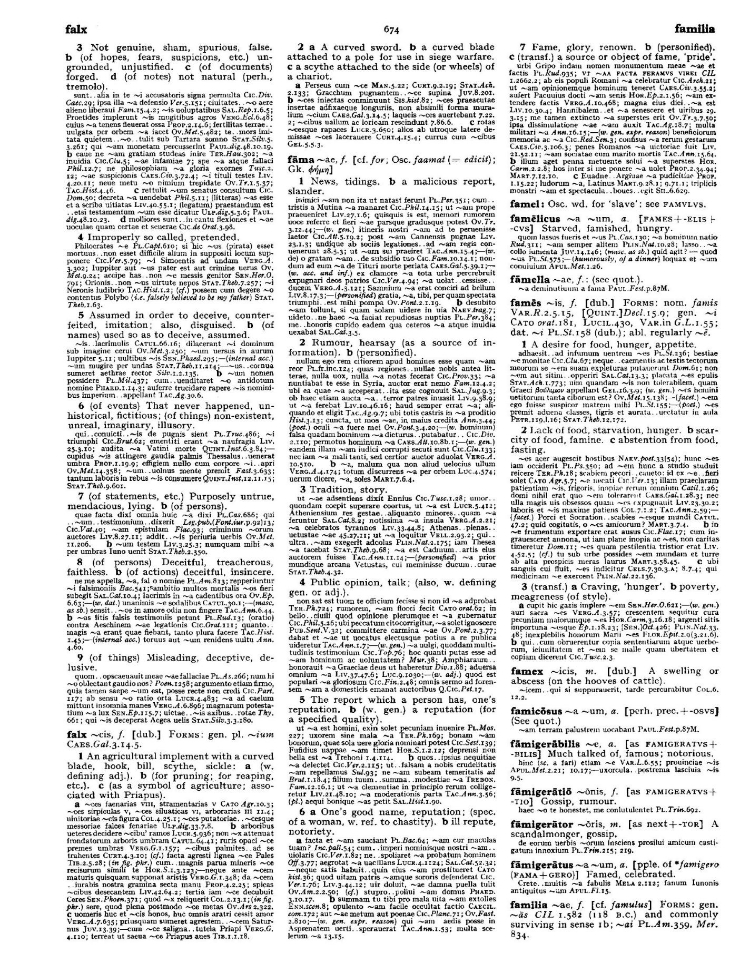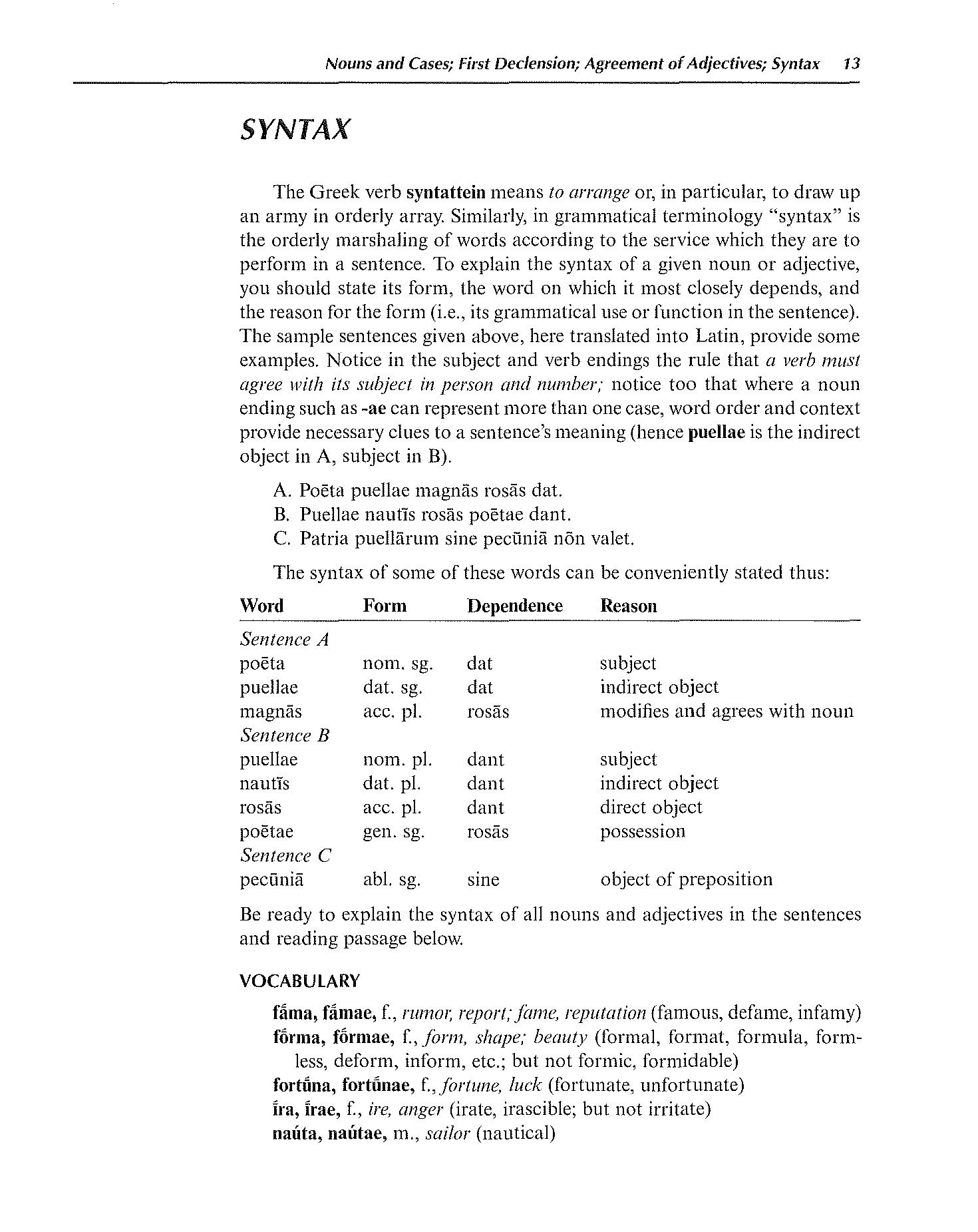
page_listing.tpl
page_subListingDetails.tpl
sub_listingDetails_style1.tpl
sub_listingDetails.title.tpl
fāma fame
fāma is a Latin Noun that primarily means fame.
Definitions for fāma
Wheelock's Latin
Noun
- 1
rumor, report, fame, reputation
English derivatives:
famous defame infamy
Oxford Latin Dictionary
Noun
- 1
News, tidings. (b) a malicious report, slander.
- 2
Tradition, story.
- 3
One's good name, reputation; (spec. of a woman, w. ref. to chastity). (b) ill repute, notoriety.
Sentences with fāma
Latin to English
Fāma Vergiliī est magna.Compare The fame of Virgil is great.
Fāma est nihil sine fortūnā.Compare Fame is nothing without fortune.
Sine fāmā et fortūnā patria nōn valet.Compare A country is not strong without fame and fortune.
Senex magnae fāmae ex patriā suā ad senātum nostrum fūgit.Compare An old man of great fame fled from his country to our senate.
Hāc fāmā narrātā, dux urbem since morā relīquit.Compare When (since, etc.) this rumor has been reported, the leader left the city without delay.
Quaque patet domitis Romana potentia terris, ore legar populi, perque omnia saecula fama, siquid habent veri vatum praesagia, vivam.Compare Wherever Rome's power extend overs the conquered world, I shall have mention on men's lips, and if the prophecies of bards have any truth, through all the ages shall I live in fame.
Fama, malum qua non aliud velocius ullum: mobilitate viget virisque adquirit eundo, parva metu primo, mox sese attollit in auras ingrediturgue solo et caput inter nubila condit.Compare Rumor, the swiftest traveler of all the ills on earth, thriving on movement, gathering strength as it goes; at the start a small and cowardly thing, it soon puffs itself up, and walking upon the ground, buries its head in the cloud-base.
Sed peccassee iuvat, vultus componere famae.Compare Yes, I glory in my fault, I won't put on a face of the sake of reputation.
Declension table for fāma
Cactus2000
| Singular | Plural | |
| Nom. | fāma | fāmae |
| Gen. | fāmae | fāmārum |
| Dat. | fāmae | fāmīs |
| Acc. | fāmam | fāmās |
| Abl. | fāmā | fāmīs |
Data sources
Notes
- Definitions
- Frederick M. Wheelock, Wheelock's Latin, 6th ed., rev. Richard A. LaFleur (New York, NY: HarperCollins Publishers, 2005): 13.
- P. G. W. Glare, Oxford Latin Dictionary, Vols. 1-8 (Oxford: Clarendon Press, 1982): 674.
- Word frequencies
- Christopher Francese, "Latin Core Vocabulary," Dickinson College Commentaries, last modified 2014, http://dcc.dickinson.edu.
- Paul B. Diederich, The Frequency of Latin Words and Their Endings, PhD diss., (Columbia University, 1939).
- Louis Delatte, Suzanne Govaerts, Joseph Denooz, and Etienne Evrard, Dictionnaire fréquentiel et index inverse de la langue latine [Frequency Dictionary and Inverse Index of the Latin Language] (Liège, Belgium: Laboratoire d'analyse statistique des langues anciennes de l'Université de Liège [L.A.S.L.A.], 1981): 121.
Bibliography
Allen, Joseph H. Allen and Greenough's New Latin Grammar for Schools and Colleges: Founded on Comparative Grammar. Edited by James B. Greenough, George L. Kittredge, Albert A. Howard, and Benjamin L. D'Ooge. Boston, MA: Ginn & Company, 1903.
Crystal, David. A Dictionary of Linguistics and Phonetics. 6th ed. Oxford, UK: Blackwell Publishing, 2008.
Delatte, Louis, Suzanne Govaerts, Joseph Denooz, and Etienne Evrard. Dictionnaire fréquentiel et index inverse de la langue latine [Frequency Dictionary and Inverse Index of the Latin Language]. Liège, Belgium: Laboratoire d'analyse statistique des langues anciennes de l'Université de Liège (L.A.S.L.A.), 1981.
Diederich, Paul B. The Frequency of Latin Words and Their Endings. PhD diss., Columbia University, 1939.
Francese, Christopher. "Latin Core Vocabulary." Dickinson College Commentaries. Last modified 2014. http://dcc.dickinson.edu/latin-vocabulary-list.
Gildersleeve, Basil L., and Gonzales Lodge. Gildersleeve's Latin Grammar: Third Edition, Revised, and Enlarged. 3rd ed. London, England: Macmillan and Co., 1903.
Glare, Peter G.W. Oxford Latin Dictionary. Vols. 1-8. Oxford, England: Clarendon Press, 1982.
Krüger, Bernd. "Latin Conjugation Tables." Cactus2000. Accessed May 5, 2023. https://latin.cactus2000.de/index.en.php.
Pierson, Nick. "Sound of Text." Accessed October 26, 2019. https://soundoftext.com.
Wheelock, Frederick M. Wheelock's Latin. 6th ed. Revised by Richard A. LaFleur. New York, NY: HarperCollins Publishers, 2005.
Wiktionary Contributors. "Victionarium." Wikimedia Foundation, Inc. Updated March 18, 2019. https://la.wiktionary.org/wiki/Victionarium:Pagina_prima.
Citation
Chicago (17th ed.)
Allo Contributors. "fāma, fāmae (n.) - Latin Word Definition." Allo Latin Dictionary. Last modified . Accessed February 20, 2026. http://ancientlanguages.org/latin/dictionary/fama-famae.
Entry created on . Last updated on .







